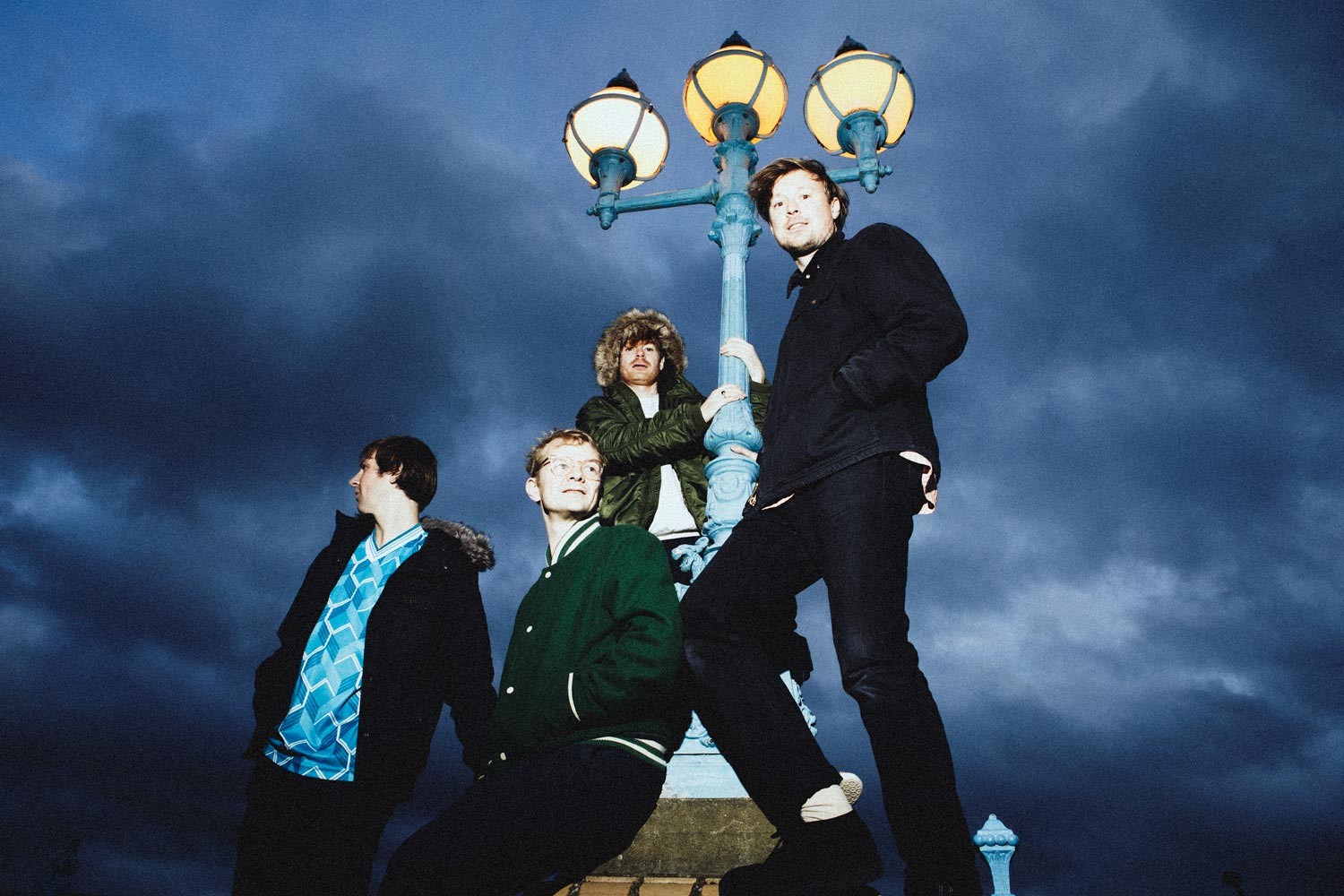Being an ‘average’ band isn’t something that’s ever really occurred to Django Django. Merely turning up to a studio, strapping on some instruments and cracking out an album – it’s not them, they’d prefer to explore every territory open to them.
“It’s not even a conscious thing to be eclectic. It’s just the way our brains work.” Drummer and producer David Maclean swiftly destroys any notion that they are, for even one second, calculated or contrived. “It’s whatever suits me. You can sit there and think you want to branch out or whatever, but I think there are a lot of grey areas in music where people have to end up making ridiculous genres to try and fit a new sound that comes along.”
Striking back hard with their third full-length effort, ‘Marble Skies’ sees David and co. utilising all their previous experiences, including a healthy number of remix commissions and watching Damon Albarn at work when they took part in his Africa Express project. Not to mention the swift success of their previous two albums, the band use these milestones to continue on their winding, evolving road.
Their first foray into an actual studio came on their second outing, 2015’s ‘Born Under Saturn’, and with that came a wealth of opportunity. “I don’t think this record would’ve been possible without what we went through with the second one,” David muses, “[considering] our first album was made completely in a bedroom.”
Nowadays you can find Django tinkering around in their own custom studio out in Tottenham. Although far more suitable for their way of thinking, even that has its flaws, with David confessing: “I think on the next one we’re keen to step it back and just go in with a few instruments because our studio is just crammed full of different synths and stuff!”
[sc name=”pull” text=”It’s just the way our brains work”]
Never ones to err away from a curveball, where better to plant one than almost straight away on your third record – after all, how many bands would dare have their album’s second track not actually feature any of their vocals, but instead those of Slow Club’s Rebecca Taylor? It’s an idea that unexpectedly stems from the influence, and ideology, of none other than Massive Attack.
The Bristol scene of the late-80s/early-90s bred this one moment for Django, as David explains. “You had Massive Attack who came out as the wild bunch, who were a sound system crew. They were producers and rappers and breakdancers; they just wanted to be immersed in England’s version hip-hop culture. That meant that they could rap themselves, or they could bring on guest vocalists and stuff, and I liked that idea – that you could listen to a Massive Attack track and there’s someone else singing.”
Rebecca isn’t the only guest appearance on the album; the titular opener features Metronomy drummer Anna Prior instead of David. It’s these collaborations that help Django thrive. “It always gives you a bit of buzz, and a bit of a boost when there’s someone new in the studio – it freshens things up a bit. Maybe that came from working with Damon Albarn, and Africa Express, and just how much he loved collaborating rubbed off on us a bit.”

This genre-less world we’re increasingly finding ourselves in perfectly suits Django Django, who can flow from dance-floor indie to experimental art-rock so easily. The level of inspiration Django call back to varies incredibly, but, as with most bands, the beginning of the creative tree finds itself at roots which are if anything unsurprising – The Beatles.
“I think they’ve been a kind of touchstone for me. I’ve spent my life thinking about The Beatles and what they got up to, and how they weren’t really scared. They were using back-brush snare loops, Northern Soul drum beats, string sections, jazz, Dixieland – they would just do whatever they felt was fun on the day, or what suited the song. That’s kind of where it all started, for us, with getting into The Beatles as kids.”
The road that Django are coasting down doesn’t have an apparent end. Even the start doesn’t really begin at Django. Each member has their own story, their own amalgamation of influences and experiences that put them where they are now. For David, his early days DJ-ing in Dundee exposed him to the idea that what the people want isn’t necessarily what they’ll respond to. You have to take risks for the greater rewards.
“Before the band, I was a DJ. I used to play house music and dancehall, I also did a reggae sound system. It was always taught to me by older DJs that you can be eclectic if that’s what you want to do. I didn’t ever really want to be in a band. I’ve got hard drives lying around full of techno so that I can put together a techno album. There’s all this stuff that we want to do that we haven’t done before the band, so it’s just about having the time to do it, and finding the right time to do it.”
[sc name=”pull” text=”I’ve got hard drives lying around full of techno so that I can put together a techno album”]
It’s this want to evolve, and to find the different; to see what everyone else is doing and give it a go – or just respecting it, that gives Django the upper hand in 2018. With everything so freely available, standing out takes more than changing your chords up. It’s about wanting to be up front, with the passion and a willingness to say yes. This is what David and his cohorts have in spades.
“The best way to approach music really is to not worry too much about what genre you’re supposed to be in.” Sage advice from one of the masterminds behind one of British music’s more refreshing bands, he continues. “There’s a lot of music out there, there’s a lot going on, and it’s an exciting time for music. Bands maybe feel a little bit lost now. If a kid were to start a band now, they might think, ‘Where would I fit in?’ But there’s always a way if you have conviction.”
It’s this thinking that’s served Django Django so well, or as David puts it: “Life’s too short to miss these opportunities for us.” Perhaps, more abstractly, he offers. “We could get together with a jazz band and make a sort of techno-driven jazz album; I don’t know, I’m just making things up,” he laughs. “But I feel like we could do something like that because why not? Life’s short, and if you’ve got an idea, go for it!”
As for what the next idea for what Django could be? Even David can’t pinpoint that but does offer some wild ideas. “The next album could be an instrumental film soundtrack or a techno record; we can do whatever we fancy doing which is the joy of making music.” It all boils down to the freedom they’ve designed for themselves now, so the future’s looking more unclear than ever – but in the best way possible. “We’re not signed to a record label that wants us to churn out hits or anything, so we feel we can go off and kind of explore what it is we want to, and not worry about what a band is ‘supposed to do’ really.”
Django Django’s album ‘Marble Skies’ is out 26th January. Taken from the February 2018 issue of Dork, order a copy below.





